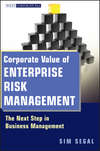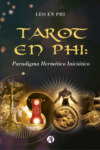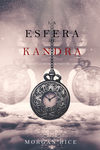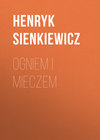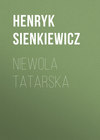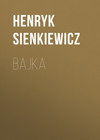Kitabı oku: «With Fire and Sword», sayfa 17
Suddenly an unearthly shriek comes from the breast of Skshetuski. The house, granaries, stables, barns, picket-fence, and cherry-orchard had all disappeared. The pale moon shone upon the hill, and on a pile of black ruins which had ceased to smoke. No sound broke the silence.
Skshetuski stood before the trench speechless; he merely raised his hands, looked, and shook his head in bewilderment. The Tartars stopped their horses. He dismounted, sought out the remains of the burned bridge, passed the trench on the cross-pieces, and sat on the stone lying in the middle of the yard. Having sat down, he began to look around like a man who tries to recognize a place in which he finds himself for the first time. Presence of mind left him. He uttered no groan. After a while he placed his hands on his knees, dropped his head, and remained motionless; it might have been supposed that he was asleep. Indeed, if not asleep, he had become torpid; and through his brain passed dim visions instead of thoughts. He saw Helena as she looked when he parted with her before his last journey; but her face was veiled as it were by mist, therefore her features could not be distinguished. He wished to bring her out of that misty covering, but could not, and went away with heavy heart. Then there passed before him the square at Chigirin, old Zatsvilikhovski, and the impudent face of Zagloba; that face remained before his eyes with a special persistence, until at length the gloomy visage of Grodzitski took its place. After that he saw Kudák again, the Cataracts, the fight at Hortitsa, the Saitch, the whole journey, and all the events to the last day and hour. But farther there was darkness! What was happening to him at the present he saw not. He had only a sort of indefinite feeling that he was going to Helena, to Rozlogi, but his strength had failed; that he was resting on ruins. He wanted to rise and go farther, but an immeasurable weakness bound him to the place, as if a hundred-pound ball were fastened to his feet.
He sat and sat. The evening was advancing. The Tartars arranged themselves for the night, made a fire, cooked pieces of horse-flesh, and having satisfied their hunger, lay down on the ground.
But before an hour had passed they sprang to their feet again. From a distance came a noise like the sound made by a great number of cavalry when moving on a hurried march.
The Tartars fastened as quickly as possible a white cloth on a pole, and renewed the fire vigorously, so that it might be seen from a distance that they were messengers of peace.
The tramp and snorting of horses, the clatter of sabres, came nearer and nearer; and soon there appeared on the road a division of cavalry, which surrounded the Tartars at once.
A short parley followed. The Tartars pointed to a figure sitting on the rising ground, – which was perfectly visible, for the light of the moon fell on it, – and said they were escorting an envoy, but from whom he could tell best himself.
The leader of the division went with some of his companions to the rising ground, but had scarcely come up and looked into the face of the sitting man, when he opened his arms and cried, -
"Skshetuski! By the living God, it is Skshetuski!"
The lieutenant did not move.
"But, Lieutenant, don't you know me? I am Bykhovets. What is the matter with you?"
The lieutenant was silent.
"Rouse yourself, for God's sake! Here, comrade, come to your mind!"
This was really Pan Bykhovets, who was marching in the vanguard of all Vishnyevetski's forces.
Other regiments came up. News of the discovery of Pan Yan spread like lightning in the regiments, therefore all hurried to greet their favorite comrade. Little Volodyovski, the two Sleshinskis, Dzik, Orpishevski, Migurski, Yakubovich, Lents, Pan Longin Podbipienta, and a number of other officers ran as fast as they could to the eminence. But they spoke in vain to him, called him by name, pulled him by the shoulders, tried to raise him up. Skshetuski looked on them with wide-open eyes, and recognized no man; or rather, on the contrary, he seemed to recognize them, but was completely indifferent to them. Then those who knew of his love for Helena-and indeed all knew that-remembered what place they were in; looking on the black ruins and the gray ashes, they understood all.
"He has lost his mind from grief," said one.
"Despair has disturbed his mind."
"Take him to the priest; when he sees him perhaps he will come to himself."
Pan Longin wrung his hands. All surrounded the lieutenant and looked at him with sympathy. Some wiped away their tears, others sighed sadly; till suddenly a lofty figure appeared, and approaching quietly, placed his hands upon the lieutenant's head. This was the priest, Mukhovetski.
All were silent and knelt down as if waiting for a miracle; but the priest performed no miracle. Holding his hands on Pan Yan's head, he raised his eyes to the heavens, which were filled with the light of the moon, and began to pray aloud.
"'Pater noster, qui es in cœlis! sanctificetur nomen tuum, adveniat regnum tuum, fiat voluntas tua-'" Here he stopped, and after a while repeated more loudly and solemnly: "'Fiat voluntas tua!'" A deep silence reigned. "'Fiat voluntas tua!'" repeated the priest for the third time.
From the mouth of Skshetuski came a voice of measureless pain, but also of resignation: "'Sicut in cœlo, et in terra!'" Then the knight threw himself sobbing on the ground.
CHAPTER XVII
To explain what had taken place in Rozlogi, we must return to that night when Pan Yan sent Jendzian from Kudák with a letter to the old princess. The letter contained an earnest request to take Helena and seek with all haste the protection of Prince Yeremi at Lubni, since war might begin at any moment.
Jendzian, taking his place in the boat which Pan Grodzitski sent from Kudák for powder, made his way with slow advance, for they went up the river. At Kremenchug he met the forces sailing under command of Krechovski and Barabash, despatched by the hetmans against Hmelnitski. Jendzian had a meeting with Barabash, whom he informed of the possible danger to Pan Yan on his journey to the Saitch; therefore he begged the old colonel not to fail in making urgent demand for the envoy when he met Hmelnitski. After this he moved on.
They arrived in Chigirin at daylight. They were surrounded at once by a guard of Cossacks inquiring who they were. They answered that they were going from Kudák with a letter from Grodzitski to the hetmans. Notwithstanding this, the chief of the boat and Jendzian were summoned to answer the colonel.
"What colonel?" asked the chief.
"Loboda," replied the essauls of the guard. "The Grand Hetman has ordered him to detain and examine every one coming from the Saitch to Chigirin."
They went. Jendzian walked on boldly, for he expected no harm since he was sent by authority of the hetman.
They were taken to the neighborhood of Bell-ringers' Corner, to the house of Pan Jelenski, where Colonel Loboda's quarters were. But they were informed that the colonel having set out at daybreak for Cherkasi, the lieutenant-colonel occupied his place. They waited rather long; at last the door opened, and the expected lieutenant-colonel appeared in the room. At the sight of him Jendzian's knees trembled under him. It was Bogun.
The hetman's power extended really to Chigirin; but since Loboda and Bogun had not yet gone over to Hmelnitski, but adhered publicly to the Commonwealth, the Grand Hetman had appointed them to Chigirin, and ordered them to maintain guard.
Bogun took his place at the table and began to question the newly arrived.
The chief of the boat, who brought a letter from Grodzitski, answered for himself and Jendzian. On examination of the letter, the young lieutenant-colonel began to inquire carefully what was to be heard in Kudák, and it was evident that he had a great desire to know why Grodzitski had sent men and a boat to the Grand Hetman. But the chief of the boat could not answer this, and the letter was secured with Pan Grodzitski's seal. Having finished his inquiries, Bogun was putting his hand to his purse to give the men something to buy beer, when the door opened, and Zagloba burst like a thunderbolt into the room.
"Listen, Bogun!" cried he; "that traitor Dopúla has kept his best triple mead hidden. I went with him to the cellar. I looked, I saw something in the corner; it was hay and it wasn't hay. I asked, 'What is that?' 'Dry hay,' said he. When I looked more closely, the top of a bottle was sticking up, like the head of a Tartar, out of the grass. 'Oh, you son of a such a one,' said I, 'let's divide the labor! Do you eat the hay, for you are an ox; and I will drink the mead, for I am a man.' I brought the fat bottle for an honest trial; only let us have the glasses now!"
Having said this, Zagloba put one hand on his hip, and with the other raised the bottle above his head and began to sing, -
"Hei Yagush, hei Kundush, but give us the glasses,
Give a kiss, and then care for naught else."
Here Zagloba, seeing Jendzian, stopped suddenly, placed the bottle on the table, and said, -
"As God is dear to me! this is Pan Yan's young man."
"Whose?" asked Bogun, hastily.
"Pan Skshetuski's, the lieutenant who went to Kudák, and before going treated me to such mead from Lubni that I wish all would keep it behind their tavern-signs. What is your master doing? Is he well?"
"Well, and asked to be remembered to you," said Jendzian, confused.
"He is a man of mighty courage. How do you come to be in Chigirin? Why did your master send you from Kudák?"
"My master," said Jendzian, "has his affairs in Lubni, on which he directed me to return, for I had nothing to do in Kudák."
All this time Bogun was looking sharply at Jendzian, and suddenly he said: "I too know your master, I saw him in Rozlogi."
Jendzian bent his head, and turning his ear as if he had not heard, inquired: "Where?"
"In Rozlogi."
"That place belongs to the Kurtsevichi," said Zagloba.
"To whom?" asked Jendzian again.
"Oh, I see you are hard of hearing," said Bogun, curtly.
"Because I have not slept enough."
"You will sleep enough yet. You say that your master sent you to Lubni?"
"Yes."
"Doubtless he has some sweetheart there," interrupted Zagloba, "to whom he sends his love through you."
"How do I know, worthy sir? Maybe he has, maybe he has not," said Jendzian. Then he bowed to Bogun and Zagloba. "Praise be to-" said he, preparing to go out.
"Forever!" said Bogun. "But wait, my little bird; don't be in a hurry! And why did you hide from me that you are the servant of Pan Skshetuski?"
"You didn't ask me, and I thought, 'What reason have I to talk of anything?' Praise be to-"
"Wait, I say! You have some letters from your master?"
"It is his affair to write, and mine to deliver, but only to him to whom they are written; therefore permit me to bid farewell to you, gentlemen."
Bogun wrinkled his sable brows and clapped his hands. Two Cossacks entered the room.
"Search him!" cried he, pointing to Jendzian.
"As I live, violence is done me! I am a nobleman, though a servant, and, gentlemen, you will answer for this in court."
"Bogun, let him go!" said Zagloba.
But that moment one of the Cossacks found two letters in Jendzian's bosom, and gave them to the lieutenant-colonel. Bogun directed the Cossacks to withdraw at once, for not knowing how to read, he did not wish to expose himself before them; then turning to Zagloba, he said, —
"Read, and I will look after this young fellow." Zagloba shut his left eye, on which he had a cataract, and read the address: -
"To my gracious lady and benefactress, Princess Kurtsevichova in Rozlogi."
"So you, my little falcon, are going to Lubni, and you don't know where Rozlogi is?" said Bogun, surveying Jendzian with a terrible look.
"Where they send me, there I go!"
"Am I to open it? The seal of a nobleman is sacred," remarked Zagloba.
"The hetman has given me the right to examine all letters. Open and read!"
Zagloba opened and read: -
"My gracious Lady, – I inform you that I have arrived in Kudák, from which, with God's assistance, I shall go to-morrow morning to the Saitch. But now I am writing in the night, not being able to sleep from anxiety lest something may happen to you from that bandit Bogun and his scoundrels. Pan Grodzitski tells me that we are on the eve of a great war, which will rouse the mob; therefore I implore and beseech you this minute, – even before the steppes are dry, even if on horseback, – to go with the princess to Lubni; and not to neglect this, for I shall not be able to return for a time. Which request you will be pleased to grant at once, so that I may be sure of the happiness of my betrothed and rejoice after my return. And what need have you of dallying with Bogun and throwing sand in his eyes from fear, after you have given the princess to me? It is better to take refuge under the protection of my master, the prince, who will not fail to send a garrison to Rozlogi; and thus you will save your property. In the mean while I have the honor, etc."
"Ho, ho! my friend Bogun," said Zagloba, "the hussar wants in some way to put horns on you. So you have been paying compliments to the same girl! Why didn't you speak of this? But be comforted, for once upon a time it happened to me-"
But the joke that he had begun died suddenly on his lips. Bogun sat motionless at the table, but his face was pale and drawn, as if by convulsions; his eyes closed, his brows contracted. Something terrible had happened to him.
"What's the matter?" asked Zagloba.
The Cossack began to wave his hand feverishly, and from his lips issued a suppressed hoarse voice: "Read-read the other letter!"
"The other is to Princess Helena."
"Read! read!"
Zagloba began: -
"Sweetest, beloved Halshko, mistress and queen of my heart! Since in the service of the prince I had but little time to stop at Rozlogi, I write therefore to your aunt, that you and she go to Lubni, where no harm can happen to you from Bogun, and our mutual affection cannot be exposed to interruption-"
"Enough!" cried Bogun; and jumping up in madness from the table, he sprang toward Jendzian.
The unfortunate young fellow, struck straight in the breast, groaned and fell to the floor. Frenzy carried Bogun away; he threw himself on Zagloba and snatched the letters from him.
Zagloba, seizing the fat bottle of mead, sprang to the stove and cried out, -
"In the name of the Father, Son, and Holy Ghost, have you grown wild, man, or mad? Calm down! be mild! Stick your head in the water-pail! A hundred devils take you! Do you hear me?"
"Blood! blood!" howled Bogun.
"Have you lost your mind? Thrust your head in the water-pail, I tell you! You have blood already, – you have spilt innocent blood. That unfortunate youth is already breathless. The devil has snared you, or you are the devil yourself with something to boot. Come to your senses, the deuce take you, you son of a pagan!"
While crying out in this fashion, Zagloba pushed around to the other side of the table, and bending over Jendzian felt of his breast and put his hand to his mouth, from which blood was flowing freely.
Bogun seized himself by the head, and howled like a wounded wolf. Then he dropped on the bench, without ceasing to howl, for the spirit within was torn from rage and pain. Suddenly he sprang up, ran to the door, kicked it open, and hurried to the anteroom.
"I hope you will break your neck!" muttered Zagloba to himself. "Go and smash your head against the stable or the barn, – though, as a horned beast, you can knock your head without danger. But he is a fury! I have never seen anything like him in my life. He snapped his teeth like a dog going to bite. But this boy is alive yet, poor fellow! In truth, if this mead won't help him, he lied when he said he was a noble."
Thus muttering, Zagloba placed Jendzian's head on his knees and began to pour the mead through his blue lips.
"We will see if you have good blood in you. If it is Jewish, when mixed with mead or wine it will boil; if clownish, being torpid and heavy, it will sink. Only the blood of a noble becomes lively and forms excellent liquor, which gives manhood and daring to the body. The Lord gave different drinks to different people, so that each one might have his own appropriate pleasure."
Jendzian groaned faintly.
"Ah, ha! you want more. No, brother, let me have some too, – that's the style. Now, since you have given sign of life, I think I'll take you to the stable and put you somewhere in a corner, so that dragon of a Cossack may not tear you to pieces when he gets back. He is a dangerous friend, the devil take him! for I see that his hand is quicker than his wit."
Zagloba raised Jendzian from the floor with ease, showing unusual strength, carried him to the anteroom, and then to the yard, where a number of Cossacks were playing dice on a rug spread on the ground. They greeted him, and he said, -
"Boys, take this youngster for me, put him on the hay, and let some one run for a barber."
The command was obeyed immediately, for Zagloba as a friend of Bogun enjoyed consideration among the Cossacks.
"And where is the colonel?" he asked.
"He ordered his horse and went to the regimental quarters. He commanded us also to be ready and have our horses saddled."
"Is mine ready?"
"Ready."
"Then bring it; I will find the colonel at the regiment. But here he comes!"
In fact, Bogun was to be seen through the arched gateway riding from the square. After him appeared in the distance the lances of a hundred and some tens of Cossacks, apparently ready for the march.
"To horse!" cried Bogun to the Cossacks who had remained in the yard. All moved quickly. Zagloba went through the gate, and looked attentively at the young leader.
"You are going on a journey?" asked he.
"Yes."
"And whither is the devil taking you?"
"To a wedding."
Zagloba drew nearer.
"Fear God, my son! The hetman ordered you to guard the town. You are going away yourself, and taking the Cossacks with you, – disobeying orders. Here the mob is merely waiting a favorable moment to rush on the nobility. You will destroy the town and expose yourself to the wrath of the hetman!"
"To the devil with the hetman and the town!"
"It is a question of your head."
"What do I care for that?"
Zagloba saw that it was useless to talk with the Cossack. He had made up his mind, and though he were to bury himself and others, he was determined to carry his point. Zagloba guessed, too, where the expedition was going; but he did not know himself what to do, – whether to go with Bogun or to remain. It was dangerous to go, for it was the same as to enter upon a hazardous and criminal affair in rough, warlike times. But to remain? The mob was in fact only waiting for news from the Saitch, – the moment of signal for slaughter; and maybe they would not have waited at all had it not been for Bogun's thousand Cossacks and his authority in the Ukraine.
Zagloba might have taken refuge in the camp of the hetmans; but he had his reasons for not doing that, – whether it was a sentence for having killed some one or some little defect in accounts he himself only knew; it is sufficient that he did not wish to show himself. He was sorry to leave Chigirin, it was so pleasant for him; no one inquired about anything there, and Zagloba had become so accustomed to everybody, – to the nobility, the managers of crown estates, and the Cossack elders. True, the elders had scattered in different directions, and the nobility sat in their corners fearing the storm; but Bogun was the prince of companions and drinkers. Having become acquainted at the glass, he made friends with Zagloba straightway. After that one was not seen without the other. The Cossack scattered gold for two, the noble lied, and each being of restless mind was happy with the other. But when it came to him either to remain in Chigirin and fall under the knife of the rabble or to go with Bogun, Zagloba decided for the latter.
"If you are so determined," said he; "I will go too; I may be of use or restrain you when necessary. We have become altogether accustomed to each other; but I had no thought of anything like this."
Bogun made no answer. Half an hour later two hundred Cossacks were in marching order. Bogun rode to the head of them, and with him Zagloba. They moved on. The peasants standing here and there on the square looked at them from under their brows, and whispered, discussing about where they were going, whether they would return soon or would not return.
Bogun rode on in silence, shut up in himself, mysterious and gloomy as night. The Cossacks asked not whither he was leading them. They were ready to go with him even to the end of the earth.
After crossing the Dnieper, they appeared on the highway to Lubni. The horses went at a trot, raising clouds of dust; but as the day was hot and dry, they were soon covered with foam. They slackened their pace then, and stretched out in a straggling band along the road. Bogun pushed ahead. Zagloba came up abreast of him, wishing to begin conversation.
The face of the young leader was calmer, but mortal grief was clearly depicted on it. It seemed as if the distance in which his glance was lost toward the north beyond the Kagamlik, the speed of the horse, and the breeze of the steppe were quieting the storm within him which was roused by the reading of the letters brought by Jendzian.
"The heat flies down from heaven," said Zagloba. "It is feverish even in a linen coat, for there is no breeze what ever. Bogun! look here, Bogun!"
The leader gazed with his deep, dark eyes as if roused from sleep.
"Be careful, my son," said Zagloba, "that you are not devoured by melancholy, which when it leaves the liver, its proper seat, strikes the head and may soon destroy a man's reason. I did not know that you were such a hero of romance. It must be that you were born in May, which is the month of Venus, in which there is so much sweetness in the air that even one shaving begins to feel an affection for another; therefore men who are born in that month have greater curiosity in their bones for women than other men. But he has the advantage who succeeds in curbing himself; therefore I advise you to let revenge alone. You may justly cherish hatred against the Kurtsevichi; but is she the only girl in the world?"
Bogun, as if in answer not to Zagloba but to his own grief, said in a voice more like that of revery than conversation, -
"She is the one cuckoo, the only one on earth!"
"Even if that were true, if she calls for another, she is nothing to you. It is rightly said that the heart is a volunteer; under whatever banner it wants to serve, under that it serves. Remember too that the girl is of high blood, for the Kurtsevichi I hear are of princely family. Those are lofty thresholds."
"To the devil with your thresholds, families, and parchments!" Here Bogun struck with all his force on the hilt of his sword. "This is my family, this is my right and parchment, this is my matchmaker and best man! Oh, traitors! oh, cursed blood of the enemy! A Cossack was good enough for you to be a friend and a brother with whom to go to the Crimea, get Turkish wealth, divide spoils. Oh! you fondled him and called him a son, betrothed the maiden to him. Now what? A noble came, a petted Pole. You deserted the Cossack, the son, the friend, – plucked out his heart. She is for another; and do you gnaw the earth, Cossack, if you like!"
The voice of the leader trembled; he ground his teeth, and struck his broad breast till an echo came from it as from an underground cave.
Silence followed. Bogun breathed heavily. Pain and anger rent in succession the wild soul of the Cossack, which knew no restraint. Zagloba waited till he should become wearied and quiet.
"What do you wish to do, unhappy hero, – how will you act?"
"Like a Cossack, – in Cossack fashion."
"Oh, I see there is something ahead! But no more of this! One thing I will tell you, that the place is within Vishnyevetski's rule and Lubni is not distant. Pan Skshetuski wrote to the princess to take refuge there with the maiden, – which means that they are under the prince's protection; and the prince is a fierce lion-"
"The Khan is a lion, and I rushed up to his throat and held the light to his eyes."
"What, you crazy brain! do you wish to declare war against the prince?"
"Hmelnitski has rushed on the hetmans. What do I care for your prince?"
Pan Zagloba became still more alarmed. "Shu! to the devil with this! This smells simply of rebellion. Vis armata, raptus puellae, and rebellion, – this comes to the executioner, the rope, and the gallows. A splendid six-in-hand, you may go high in it, if not far. The Kurtsevichi will defend themselves."
"What of that? Either I must perish, or they. I would have given my life for the Kurtsevichi, since I held them as brothers, and the old princess as a mother. Into her eyes I looked as a dog looks! And when the Tartars caught Vassily, who went to the Crimea and rescued him? I! I loved them and served them as a slave, for I thought that I was earning the maiden. And for this they sold me like a slave to an evil fate and misfortune. They drove me away; but I will go now, and first I will bow down to them in return for the bread and salt that I have eaten in their house, and I will pay them in Cossack fashion. I will go, for I know my road."
"And where will you go, when you begin with the prince, – to the camp of Hmelnitski?"
"If they had given me the girl, I should have been your Polish brother, your friend, your sabre, your sworn soul, your dog. I should have taken my Cossacks, called others together in the Ukraine, then moved against Hmelnitski, and my own brothers, the Zaporojians, and torn them with hoofs. Did I wish reward for this? No! I should have taken the girl and gone beyond the Dnieper, to the steppes of God, to the wild meadows, to the quiet waters. That would have been enough for me; but now-"
"Now you have become enraged."
Bogun made no answer, struck his horse with the nogaika, and rushed on. But Zagloba began to think of the trouble into which he had got himself. There was no doubt that Bogun intended to attack the Kurtsevichi, to avenge the injustice done him, and carry off the girl by force. Zagloba would have kept him company, even in an undertaking like this. In the Ukraine such affairs happened frequently, and sometimes they went unpunished. True, when the offender was not a noble, such a deed became complicated, more dangerous; but the enforcement of justice on a Cossack was difficult, for where was he to be found and seized? After the deed he escaped to the wild steppe, beyond the reach of human hand; and how many could see him? When war broke out, and Tartars invaded the country, the offender appeared again, for at such times laws were asleep. In this way Bogun, too, might save himself from responsibility. Besides, Zagloba had no need of giving him active assistance, and taking on himself half the fault. He would not have done this in any case; for though Bogun was his friend, still it did not beseem Zagloba, a noble, to engage with a Cossack against a noble, especially as he was acquainted with Skshetuski, and had drunk with him. Zagloba was a disturber of no common order, but his turbulence had a certain limit. To frolic in the public houses of Chigirin, with Bogun and other Cossack elders, especially at their expense, – but it was well too, in view of Cossack troubles, to have such people as friends. Zagloba, though he had got a scratch here and there, was very careful of his own skin; therefore he saw at once that through this friendship he had got into a desperate muddle. For it was clear that if Bogun should carry off the maiden, the betrothed of Vishnyevetski's lieutenant and favorite, he would come into collision with the prince; then nothing would remain for him but to take refuge with Hmelnitski and join the rebellion. To this Zagloba mentally opposed his positive veto. To join the rebellion for the beautiful eyes of Bogun was altogether beyond his intention, and besides he feared Yeremi as he did fire.
"Oh, misery!" muttered he to himself; "I have caught the devil by the tail, and this time he will catch me by the head and twist my neck. May lightning strike this Bogun, with his girl face and his Tartar hand! I've gone to a wedding, indeed, a regular dog-fight, as God is dear to me! May lightning strike all the Kurtsevichi and all the women! What have I to do with them? They are not necessary to me. No matter who has the grist, they will grind it on me. And for what? Do I want to marry? Let the evil one marry, it is all the same to me; what business have I in this affair? If I go with Bogun, then Vishnyevetski will flay me; if I leave Bogun, the peasants will kill me, or he will do it without waiting for them. The worst of all is to be intimate with a bear. I am in a nice plight. I should rather be the horse on which I am sitting, than Zagloba. I've come out on Cossack folly. I've hung to a water-burner; justly, therefore, will they flay me on both sides."
While occupied with these thoughts, Zagloba sweated terribly, and fell into worse humor. The heat was great; the horse travelled with difficulty, for he had not been on the road for a long time, and Pan Zagloba was a heavy man. Merciful God! what would he have given then to be sitting in the shade at an inn, over a glass of cool beer, not to weary himself in the heat and rush on over the scorching steppe!
Though Bogun was in a hurry, he slackened his pace, for the heat was terrible. They fed the horses a little. During that time Bogun spoke to the essauls, – apparently gave them orders, for up to that time they did not know where they were going. The last word of the command reached Zagloba's ear, -
"Wait the pistol-shot!"
"Very well, father."
Bogun turned suddenly to Zagloba: "You will go in advance with me."
"I?" asked Zagloba, in evident bad humor. "I love you so much that I have already sweated out one half of my soul; why should I not sweat out the other half? We are like a coat and its lining, and I hope the devil will take us together, – which is all the same to me, for I think it cannot be hotter in hell than here."






